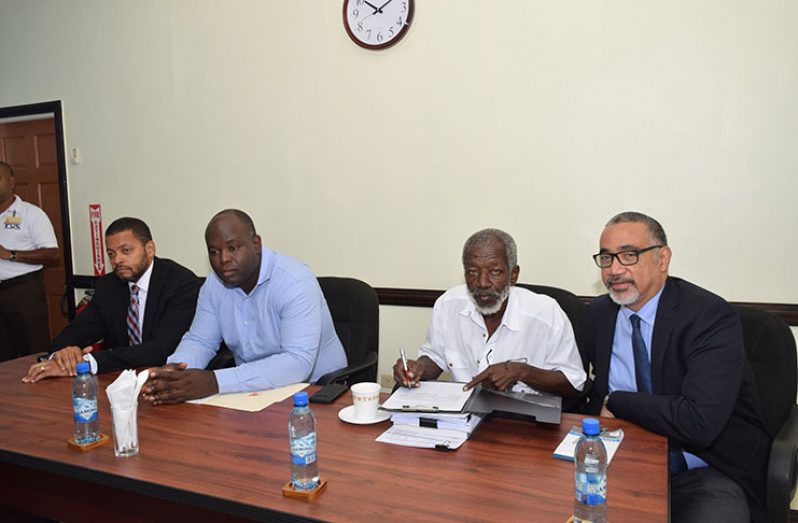INCREASED cellular usage, coupled with a significant decline in the use of landline services here is making it difficult for the Guyana Telephone and Telegraph (GTT) Company to offer the latter, Chief Executive Officer (CEO) Justin Nedd said when the telephone giant appeared before the Public Utility Commission (PUC) in another attempt to increase its domestic rates. The dire situation was painted on Friday by Nedd when a team of GTT officials appeared before the PUC chaired by Justice Prem Persaud at the commission’s New Garden Street office.
In 2014, GTT had filed an application to raise domestic rates for some of its services, but the PUC had rejected the application in 2015. Subsequent to an appeal, GTT has now applied to the Commission for the order to be reviewed in keeping with Section 77 of the Public Utility Commission Act. The telephone company is also seeking to have temporary rates approved in order to secure some amount of relief.
GTT’s application, which still stands, proposes increases for services, such as installations, transfers, additional jacks, wake-up call, three-way calling, voicemail, call forwarding and reconnection. The company is also seeking to increase rates for intra-exchange calls during peak hours by 40 per cent and during non-peak hours by 60 per cent. The current intra-exchange call rate is $.60 (peak) and $.30 (non-peak).
For inter-exchange calls (calls from one zone to another), it proposed increases by 20 per cent for both peak and non-peak hours. The current rates for peak hours, per minute are Zone A-$3, B-$4, C-5$ and D-$7. During non-peak hours the rates are $2, $3.6, $4.8 and $5, respectively.
On Friday, Nedd said the company’s key performance indicators have gotten worse since the application was initially made in 2014.
In re-establishing the case, the CEO said GTT’s rates for local landline services have not changed in over 15 years, noting that from the initial stage they were below cost. These services, however, have been subsidised by high-margin, long-distance revenues or international calls since 1991. But the situation has become less desirable, Nedd contended.
“The current tariffs do not allow GTT to earn any return, let alone an adequate enough [sic] return to maintain the landline services. The thing is the situation would only worsen with other revenue sources being substantially diminished by competition, legal or otherwise,” he told the Commission.
Nedd emphasised that throughout GTT’s history low-cost services have been supported by margins associated with the company’s exclusive line of business, particularly, the international bypass, but said international long-distance revenues have declined substantially due to illegal bypass and technological substitutes such as SKYPE and What’s Up Voice.
“These activities have and continue to substantially reduce billable international usage. International long distance could no longer be relied upon as a major profit centre for GTT, as such international long- distance service is no longer supporting the below-cost, domestic-wired dial tone service,” the CEO explained.
These rates, Nedd lamented, are 400 to 700 per cent times below existing rates in the region and even in the developed world.
“The rental rates for dial-tone services requested in our filing will begin the process of moving the rates to a level where sufficient revenue is earned to make the local network self-sustaining. It is not self-sustaining in its current dispensation,” he added.
Additionally, it was pointed out that since January 2006, the average meter minutes of use for landlines have dropped by 55 per cent.
Moreover, during the period of January 2012, to the time of the original filing in 2014, the drop has been 30 per cent, and Nedd noted that mobile phones are increasingly being used as a substitute. It is estimated that there are more than 600, 000 active mobile lines in Guyana.
“Fewer customers on the landline network, means that the costs associated with maintaining the network are spread across [a] diminishing base,” the CEO said.
He noted that consumers choose cellular for convenience of mobility, although it is approximately eight to 10 times more expensive.
“The fact that cellular calling is this popular, despite being more expensive, shows that consumers have adequate incomes to purchase the telephone service and are not making rational choices motivated by affordability, but those choices are made by convenience,” he argued. Nedd urged the Commission to expeditiously approve the rates.
However, Chairman of the Guyana Consumers Association, Pat Dial, did not buy into GTT’s argument. Though not well, Dial made every effort to offer his opinion on the situation.
He said it was unfair for the company to compare Guyana with other countries within the region and even in the developed world, stating that every country is unique and as such measures must be applied differently.
“Every business faces the same kinds of problems, but they adjust and they deal with it and they don’t come and ask their customers to pay more; what they do, they take necessary actions to make their business more payable,” he told the commission in the presence of the GTT officials.
Upon hearing the submissions, the Commission adjourned the session to allow GTT to file its documents.
GTT renews call for hike in rates …makes case before PUC
SHARE THIS ARTICLE :
Facebook
Twitter
WhatsApp



.jpg)










